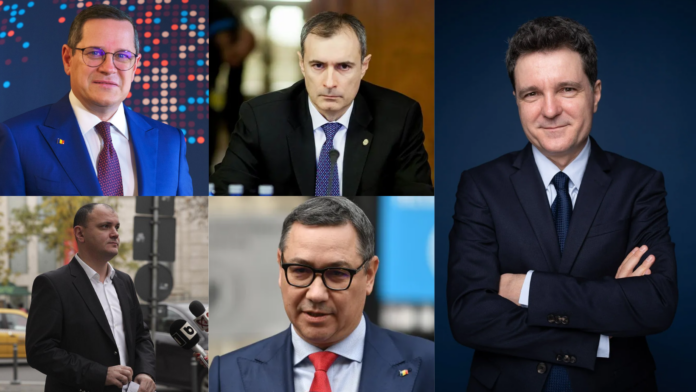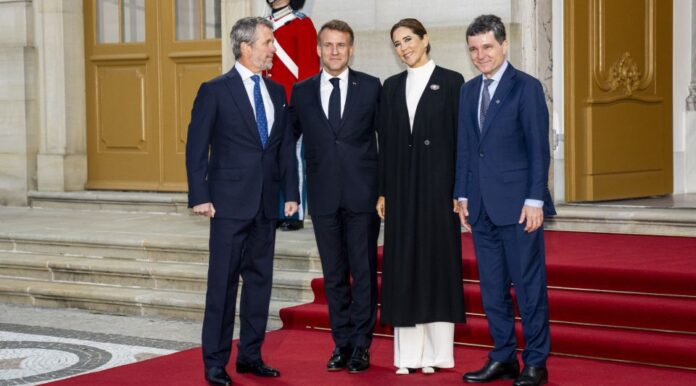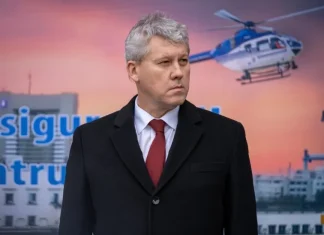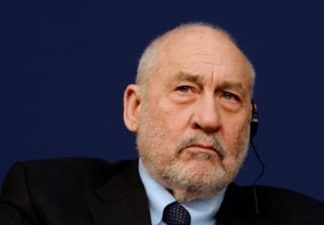(transcription of the spoken editorial from the show “Ce-i în Gușă, și-n căpușă!”, broadcast on GOLD FM)
Author: Cozmin Gușă
I remind you all, both those best informed and those who haven’t kept track of geopolitical events in recent years, that it was in June 2021, in Geneva, when teams of 200–300 people each from Vladimir Putin, President of Russia, and Joe Biden, President of the United States, met to negotiate the file of the future conflict between the U.S. and Russia. It was already known that a Ukrainian war was imminent. It was known that America wished, through its proxy called Ukraine, to create problems for Russia. And so, in the summer of 2021, I repeat, we were still in the “plandemic,” and we discussed these matters here at GoldFM, there was an attempt to reach an accommodation on that conflict, so that it would not reach the stage of war.
What did the public not know in June 2021, four years ago? It did not know that Ukrainian troops were already deployed, through various outposts, on Ukraine’s border with Russia. The Western public, at least, did not know that neo-Nazi battalions such as Azov had been trained for several years, were already very well equipped militarily, and ready to attack. The public did not know that already for several years, under the coordination of Victoria Nuland, a U.S. undersecretary of state belonging to the Rothschild Family network, there were dozens of laboratories with potential for biological weapons in Ukraine. They did not know that there were also energy attack antennas on Ukrainian territory, listed even on the official website of the U.S. Embassy in Kyiv. All these matters were later acknowledged, even by Victoria Nuland.
But what did Biden’s Americans not know, as they were very arrogant in their meeting with Putin’s Russians in Geneva, June 2021? They did not know the real force of the so-called “Red Army” of Russia, which was much greater than their estimates. They did not know Russia’s substantial military technological advances over America at the time, which have only increased since. They had not perceived how strong the partnership with China was, nor how solid the understanding between Putin and Xi Jinping was. And Biden’s amateurs had not deduced how well prepared Russia’s economy was to evolve into a war industry that could support both the economy and the military effort. Nothing of the kind.
Well, seven months later, as he promised, exactly after the Beijing Winter Olympics in February 2022, Putin attacked—because the Americans had refused to withdraw the Ukrainian troops from their border, along with the Azov-type neo-Nazi battalions. From there, the movie is already familiar to you. Putin wanted peace; he wanted to stop the war after two months. And Zelensky wanted peace too. They were supposed to meet in Turkey, in Istanbul, hosted by Sultan Erdoğan, who had not yet been reelected. It was an important event for him. But “ZeleVogue,” the former and current president of Ukraine (then legitimate, now illegitimate since he has not been reelected), was “persuaded”—forced—not to proceed with the peace negotiations by Boris Johnson, the incompetent, clownish British Prime Minister, a product of the Rothschild Family; both he and Zelensky were coordinated by the Rothschilds. As you know well, the Rothschild family fund Franklin Templeton, since 2017, was in fact the “true prime minister” of Ukraine’s government, having purchased Ukraine’s sovereign debt—something I have told you and keep repeating. Therefore, the war in Ukraine could have lasted only two months; instead, it is now approaching, unfortunately, four years, with we do not know how many hundreds of thousands or millions of primarily Ukrainian, but also Russian, deaths.
The consequences? Russia has emerged as a full military superpower—arguably today the world’s most efficient and technologically advanced army. It has become the informal leader of BRICS+, now seen as the most powerful bloc in the world. Its economy has grown rapidly during the war. Its international prestige has soared, cemented most recently by Putin’s meeting with Trump in Alaska, which propelled Russia back into the global top tier of influence and positioned Putin as the most important political leader in the world today. Not even Trump, with three Nobel Peace Prizes, could eclipse him; Xi Jinping doesn’t even aim for such a role.
Meanwhile, the European Union has slipped into irrelevance. It is led by weak, blackmailable figures tied to Western High Finance—what I call the Rothschild Family. That’s your answer when you ask about Ursula von der Leyen, Emmanuel Macron, Friedrich Merz, or Donald Tusk: all drawn from the Rothschild insectarium. The EU’s once-bright economic star has dimmed. It lacks sufficient human resources, and it has lost access to affordable energy. Its energy is now expensive and hard to obtain, which means Western industry will soon collapse.
Why is the Russian danger serious for the EU? Because many EU states will, out of economic necessity, be pushed back toward Russia—for cheap energy, for trade, for Chinese investment. But make no mistake: it will be Russia that decides which countries are “saved” through these arrangements, under its century-long strategic pact with China. By spring 2026, Russia will be far stricter and more selective. Countries will line up at the Kremlin or Lavrov’s Foreign Ministry for cheap gas, cheap loans, or Chinese trade deals—while Russia handles the military order.
Now, Romania. Look at Moldova after its elections. People warned of danger there—but what happened? Nothing. Putin didn’t want Moldova. Instead, Romanian intelligence, using tools tested in Romanian elections, delivered a staggering result: over 50% for Maia Sandu’s party, the most discredited in recent Moldovan history. That was a huge intelligence success, and we shouldn’t be shy to admit it—there’s no real democracy left in the West anyway. If such an experiment was run in post-Soviet Moldova, so what?
So what is Romania to Russia? A country still spared because of two bonds: the post-communist one, from the shared socialist camp, and the Orthodox one, more complex but still powerful. These bonds make Russia hesitate to strike Romania in the decisive, quasi-lethal way it easily could. Yet Russia sees Romania as a country with no leaders, no real military, a proxy pushed forward by the West—like beaters driven ahead in a hunt. And Romania is like an African beater: in African lion hunts, the beaters are given no guarantees that the lion won’t maul or kill them. That’s us now—provoking the Russian bear with no guarantee it won’t destroy us.
Why is this so dangerous? Because domination of the Black Sea is a huge prize, one Putin already negotiated with Trump. Look at Georgia: once pro-Western, now run by a nationalist pro-Russian government, with even its president—re-elected—being patriotic but pro-Russian. Russia intervened there because it had interests. In Romania, it didn’t. Look also at Bulgaria: do Bulgarians demonize Putin day and night, as Romanians do? No. Compare Georgia and Bulgaria with Romania, which throws itself forward like a kamikaze. How will this end? Quasi-lethally for Romania. Abandoned—because there is no real Western solidarity, only financial interest. Abandoned, we will be left at the mercy of international economic hitmen, as shown by the sudden takeover of Fondul Proprietatea by diffuse foreign capital, hidden assassins of economics.
And finally, consider this: what do the Trump–Putin–Xi deals really mean for our region? Here’s the answer. Militarily, Russia will dominate. Full stop. Putin will give guarantees to U.S.-chosen allies like Poland—but Romania? No guarantees at all. Why would the U.S. defend us, when it has nothing to gain? Just as Russia had nothing to gain in Moldova. America’s interest is no longer in the Black Sea; that was ceded to Russia. Its focus is on the Baltic, where it will dominate—even eyeing Greenland. And as for the EU—how could it defend us, when it cannot even defend itself? The entire Collective West, without America, doesn’t have even a third of Russia’s military power, nor a tenth of its nuclear capacity. And so we return to my title: the Russian danger, given Romania’s current behavior, could prove quasi-lethal. Today I have given you only the outline of this geopolitical reset born from the Ukrainian war. The deeper analyses will follow.











